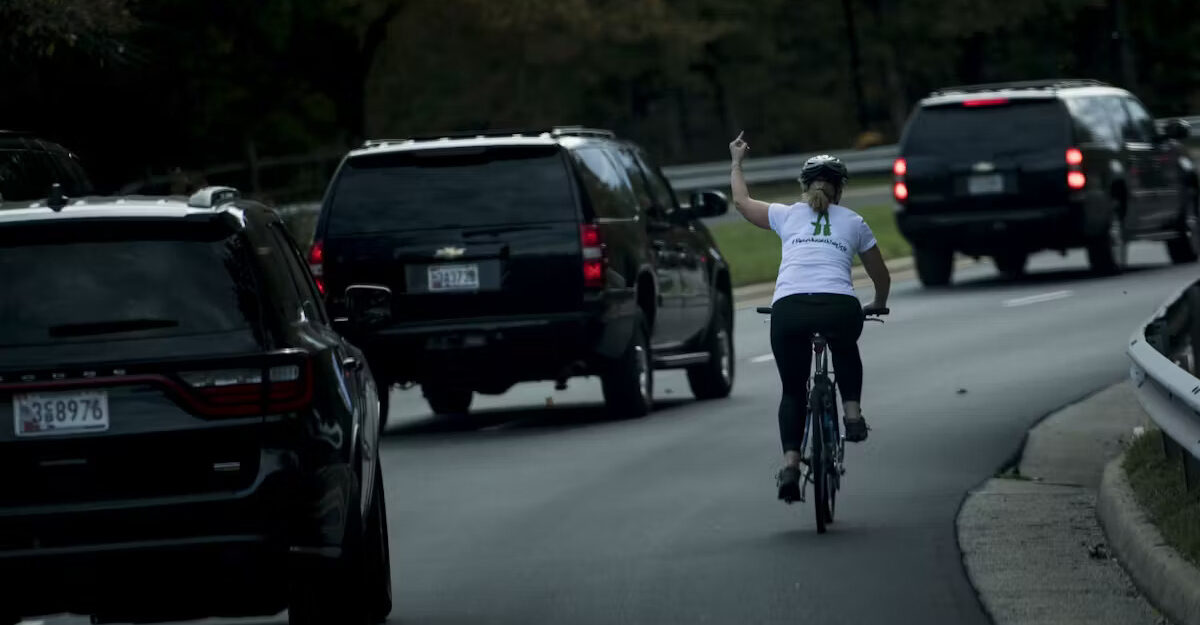Fired After Flipping Off Trump’s Motorcade: The Julie Briskman Case and Employee Rights

One photo. One gesture. And one viral moment that changed everything.
In 2017, Julie Briskman, a 50-year-old marketing executive from Virginia, was cycling past Donald Trump’s motorcade when she raised her middle finger in protest. A photographer captured it, the image spread online worldwide, and within days, Briskman was out of a job.
She hadn’t been at work, wasn’t wearing company clothing, and wasn’t identified until she disclosed it herself. Still, her employer — a government contractor — claimed she violated its conduct and social media policies. More likely, they feared losing business with the federal government.
The story sparked outrage and questions that remain relevant today: can employees be fired for what they do on their own time — especially online?
What Happened?
- Briskman spontaneously flipped off Trump’s motorcade while on a bike ride in Northern Virginia.
- The photo went viral, making headlines around the world.
- She privately told her employer she was the cyclist in the photo.
- Days later, she was terminated and escorted out with her belongings.
- The company cited code-of-conduct and social media violations, but many believed the firing was about protecting government contracts.
- In 2018, Briskman filed a wrongful termination lawsuit against her employer, arguing the firing was unfair and inconsistent with how other employees had been treated.
US vs. Canadian Law
The US Context
Virginia is an at-will employment state.
- Employers can fire workers for almost any reason — or none at all — with no obligation to provide notice or severance.
- Briskman had no real legal recourse.
The Canadian Difference
In Canada, non-unionized employees are entitled to stronger protections.
- Employers can dismiss workers without cause — but they must pay severance unless they prove just cause.
- “Just cause” is a strict legal test requiring serious misconduct, which is rare.
As our lawyer Alex Lucifero explained in an interview, “there are cases where off-duty conduct can be cause for termination, but they are the exception. Something like flipping the bird at the president would more likely lead to severance, not no compensation at all.”
Partner Jon Pinkus added, “employees shouldn’t assume that what they do outside of work will never affect their job. In Canada, though, employers almost always still have to pay severance unless the conduct is extreme.”
And in 2018, co-founding partner Lior Samfiru weighed in: “This isn’t about free speech. That only applies to government. The real problem was linking herself to her employer on social media. In the US, the company has a strong defence. In Canada, it would more likely be treated as a mistake — not a reason to deny severance.”
The Role of Social Media
The Briskman case underscored how personal lives and professional reputations collide online:
- Social media isn’t private. Even with settings enabled, viral content spreads quickly.
- Job roles matter. A senior, public-facing executive will be held to a higher standard than a junior employee.
- Employers weigh reputation. If your actions harm business relationships, discipline or dismissal may follow.
As Pinkus explained: “When you post online, you’re effectively a public broadcaster. That blurs the line between your personal and professional life.”
What Would Happen in Canada?
If Briskman had been employed by a Canadian company:
- She could still be dismissed — employers have the right to end employment without cause.
- But she would almost certainly be entitled to severance pay, potentially months or even up to two years’ worth depending on her age, role, and years of service.
- Only if the employer proved “just cause” — highly unlikely in this situation — could severance be denied.
Media Coverage

November 6, 2017 — Newstalk 580 CFRA in Ottawa covered the viral firing of Julie Briskman after she flipped off Donald Trump’s motorcade. Alex Lucifero, employment lawyer at Samfiru Tumarkin LLP, explained that while shocking, the case underscored a key reality: off-duty conduct can still cost you your job.
“Whether you agree with it or not, your behaviour outside the office can lead to discipline — and in extreme cases, dismissal. In Ontario and Canada, though, most of the time that would mean severance pay, not a total loss of compensation.”

November 2, 2017 — 610 CKTB in St. Catharines also reported on Briskman’s dismissal. Jon Pinkus, employment lawyer at Samfiru Tumarkin LLP, emphasized the stark difference between US and Ontario law, and the role social media plays in blurring professional and personal life.
“When you post online, you’re essentially broadcasting to the world. Employers can react if it damages their reputation — but here in Canada, that doesn’t automatically strip you of severance. The standard for just cause is very high.”

April 16, 2018 — Global News Radio 640 Toronto reported on Briskman’s lawsuit against her former employer. Lior Samfiru explained why her chances of success were slim in the US:
“This isn’t about free speech. That only protects you against the government, not a private company. The real issue is that by posting the photo online and identifying herself, she tied her employer to the controversy. In the US, where laws heavily favour employers, she’s unlikely to win. In Canada, though, it would have been seen as a lapse in judgment — not grounds to deny severance.”
Key Takeaways for Canadian Employees
- Your private actions can have workplace consequences — especially if they go viral.
- Canadian law protects you — even if you’re fired for personal conduct, you may still be owed significant severance.
- “Just cause” is rare — it applies only in extreme cases of serious misconduct.
- Social media is never truly private — think carefully about how posts could be tied back to your employer.
Protecting Your Rights
If you’ve been fired for something you did on social media or in your personal life, you are still likely entitled to significant compensation.
At Samfiru Tumarkin LLP, Canada’s leading employment law firm for non-unionized employees, we’ve helped thousands of workers secure their rights after wrongful dismissal.
- 👥 Over 50,000 clients helped nationwide
- 💰 Millions recovered in compensation
- 📱 Free Termination Consultations — in most, but not all, cases
- ⚖️ No win, no fee — you don’t pay unless we succeed
- ⭐ 3,063 5-star Google reviews across all offices (4.7 average)
- 🏆 Named one of Canada’s Best Law Firms by The Globe and Mail




